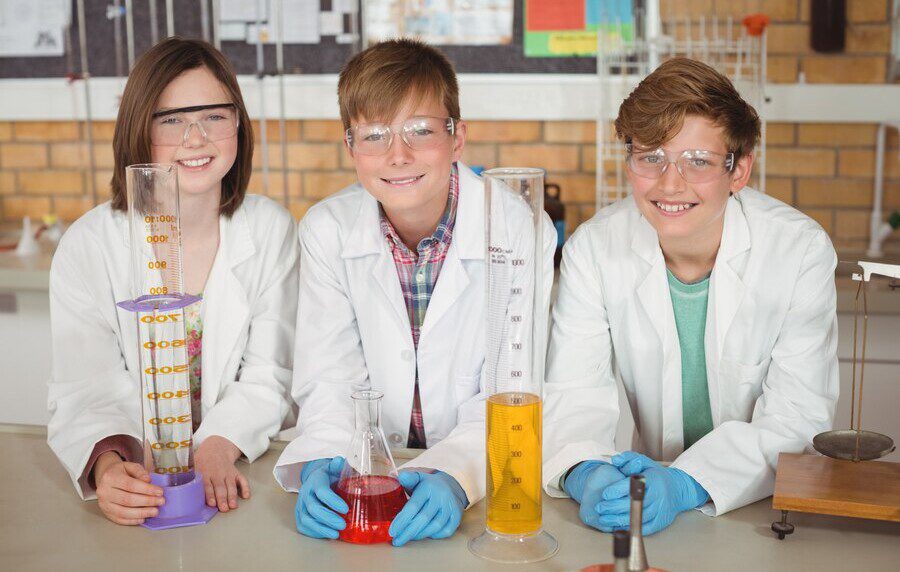
High school is all about exploring new things. It’s often where students fall in love with science, especially if they dive into school competitions.
Science competitions can truly spark students’ interest, taking their passion for STEM up a notch. These competitions stoke their enthusiasm for science, technology, engineering, and maths. They also hone their research, data interpretation, and public speaking skills.
So, if you’re a high school teacher or administrator keen to get your students excited about science competitions, here are 8 fantastic ways to get them involved.
#1 Foster an Inclusive Environment

Promoting inclusivity in science competitions is vital. This ensures every participant feels welcome and confident enough to join in. No matter their background or skill level, give everyone access to the resources and support they need.
Why not hold regular science club meetings? It’s a great way for students to share ideas and work together. This can help eliminate any worries about joining in and make the whole thing more manageable.
It’s all about working together, highlighting the importance of teamwork alongside individual efforts. This not only creates a supportive environment but also fosters important skills that students will need in their future scientific pursuits.
It’s important to approach the competition as a collective effort. This puts emphasis on the value of teamwork as much as the contribution of individuals.
#2 Incorporate Real-world Application
When students see the real-world implications of their work, they are often more enthusiastic. This is why it’s important to highlight the relevance of the subject matter and its impact when promoting a science competition for school students.
You need to choose themes that tie into current global issues—such as climate change, healthcare innovations, or sustainable technologies. You can help students see that their contributions to these competitions are not just assignments but have the potential to solve real problems.
This method makes the competition more serious and can motivate students to pursue their science projects with more purpose.
#3 Use Interactive Workshops and Demonstrations

If you want to give students a hands-on experience of the structure and expectations of science competitions, you can hold workshops and demonstrations.
They can be introduced to formulating hypotheses, analyzing data, and honing their presentation skills. For example, you could run workshops on crafting impactful scientific posters or mastering public speaking in a scientific context.
Make these sessions enjoyable and interactive. This way, you can help ease the student’s nerves and demonstrate how joining science competitions can be both educational and fun.
#4 Spotlight Past Success Stories
High school students get motivated when they see their peers succeeding in similar challenges. This is why you should highlight the successes, projects, and awards of past participants in science competitions.
Give students a chance to talk about what they went through, including the ups and downs, with their peers.
You can motivate students further by having guest speakers or panel discussions. This makes the competition process clearer, and students can get tips on how to succeed.
As a bonus, you can also invite alumni who have gone on to pursue careers in STEM fields to share their experiences and how participating in science competitions helped shape their career paths.
This will give students insight into the potential opportunities that await them if they continue pursuing their interests in STEM.
By showing off what these role models have achieved, students can understand that success is within reach and that they can shine in science competitions, too.
#5 Offer Incentives and Recognition
Reward participation with awards, big or small, like certificates, a spot in the school’s science hall of fame, or tangible prizes. These rewards help motivate students.
Offer chances for internships, mentorships, or scholarships too, giving students a clear way to further their science careers.
Encourage students to share their research at conferences or symposiums. This lets them showcase their work and get recognition from peers and professionals. It also introduces them to new ideas and perspectives, sparking their passion for science even more.
Finally, make sure students know their efforts are appreciated. This encouragement not only boosts their current competition efforts but also keeps them interested in science in the long term.
#6 Promote an Environment of Peer Support

Creating a peer support culture in high school science competitions can greatly improve students’ learning and motivation.
Encouraging them to form study groups or project teams helps them share ideas, solve problems together, and provide moral and academic support to each other.
This approach builds a sense of community and belonging, boosting creativity and innovation. By fostering an environment of mutual respect and encouragement, students will feel more confident in their abilities and dedicated to their scientific projects.
#7 Leverage Digital Platforms for Enhanced Reach and Engagement
Using digital platforms can greatly increase the number of high school students who how many high school students get involved in science competitions. Social media, online forums, and educational websites are excellent for spreading the word, sharing updates, and offering tips.
Setting up a specific website or social media page for the competition can create a community where participants, mentors, and fans can connect, share experiences, and learn from each other.
Also, hosting webinars and virtual meetings can make workshops and information sessions more accessible, overcoming geographical limits and attracting a broader audience. This way, more students can learn valuable things.
By leveraging these digital tools, organizers can build a lively and supportive community that helps young scientists grow and encourages more students to join science competitions.
#8 Maintain Ongoing Support and Feedback
Regular support and feedback are key to keeping high school students engaged and motivated during science competitions.
Creating a system for constructive criticism and quick answers to questions can greatly improve their development and confidence. Regular meetings with mentors, teachers, or peers ensure students feel supported throughout.
This ongoing involvement keeps up their enthusiasm, helps them keep going when it gets tough, and makes science competitions a more rewarding experience.
In Summary
Getting high school students into science competitions goes beyond just winning. It’s about sparking a lifelong love for science.
To truly inspire your students, focus on creating a supportive space, demonstrating science’s real-world uses, offering practical experiences, celebrating achievements, and giving proper recognition.
These competitions are the stepping stones to future breakthroughs, and your support is key in preparing that foundation.
Read Also:




























